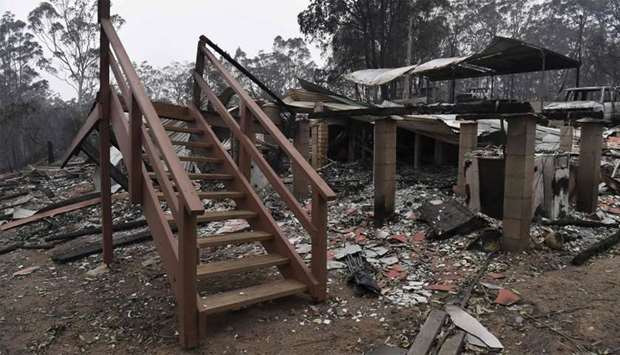As firefighters struggled to contain bushfires on Wednesday, Australian authorities ordered immediate evacuations for the people most threatened, including those in coastal tourist destinations.
Hot, dry and windy conditions created a severe fire danger in the state of Queensland, with more than six dozen fires still burning in the afternoon, four of them at an emergency level and seven others at a ‘watch-and-act’ level.
As some 1,500 firefighters were deployed to fight the bushfires across the state, residents in several towns were issued with ‘leave now’ warnings.
One is Noosa North Shore, a popular beachside holiday destination some 150 kilometres south of the city of Brisbane, according to the Queensland state fire and emergency service.
The fire was burning within a kilometre of the beachside campground, and the only way out of Noosa North Shore is via the water. Locals were told to get on the ferries while they still could.
‘The dinghies are in the water and primed to go,’ local resident Dave Wright said, in comments to Australian newswire AAP.
Fire authorities also issued a ‘leave now’ warning for Pechey, a town some 150 kilometres inland from Brisbane.
A water-bombing helicopter crashed while trying to fight bushfires in Pechey, Australian broadcaster ABC said. The pilot reportedly survived and was treated with minor injuries.
14 homes have been lost in Queensland state since late last week when the latest round of bushfires started, which forced local authorities to issue a state of emergency across 42 local government areas.
In the neighbouring state of New South Wales, more than 70 fires were burning - 50 were uncontained, but none were at an emergency level on Wednesday afternoon, the Rural Fire Service said.
On Tuesday, a ‘catastrophic fire danger’ alert had been issued for Sydney, the most populous city in Australia, and nearby regions, with hot and dry weather, temperatures in the high 30s and strong winds of 80 kilometres per hour.
Hollywood actor Russell Crowe said on Twitter that his property in Nana Glen, near Coffs Harbour on the New South Wales coast, was ‘hit’ by the bushfires but his family was safe.
The Rural Fire Service said 50 homes were destroyed on Tuesday, bringing the number of properties damaged or destroyed since last week to more than 300.
No lives were lost on Tuesday, the fire service said, but 21 people, including 13 firefighters, were injured.
New South Wales Premier Gladys Berejiklian said Wednesday that she was ‘hugely relieved’ that no more lives were lost on Tuesday.
The bushfire season in Australia has started early this year. More than 1.1 million hectares have been destroyed - more than the combined total for the past three bushfire seasons, the Rural Fire Service said.
A state of emergency is in place for the whole week in New South Wales due to the danger of spreading fires. More than 150 schools are still closed across the state.
Since last week, when the latest round of bushfires started, at least three people have died and more than 120 people have been injured.
Some 3,000 firefighters, hundreds of fire trucks and 80 aircraft have been deployed or are on standby, according to RFS.
Fire authorities said Wednesday it could take many months to bring all the fires under control unless there is rain.
‘Unfortunately, what we need is rain. What we need is meaningful rain.
‘And there is certainly nothing in the forecast for the foreseeable future that's going to make any discernible difference to the conditions that we are experiencing,’ RFS Commissioner Shane Fitzsimmons told reporters in Sydney on Wednesday morning.

